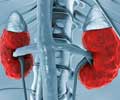New study highlights that managing phosphorus levels can improve the quality of life in patients with kidney failure.

‘Medication and a diet low in phosphorus can help people who are suffering from kidney failure to lower the levels of FGF23 in their bodies.’
Read More..




The build-up of this hormone causes troublesome effects on other organs. For instance, the cardiovascular system is affected by high levels of this hormone; the heart enlarges (this is known as hypertrophy), and this increases the risk of death. This led a research team made up of researchers from the University of Cordoba's Medical School, the GC13 and GC07 groups from the Maimonides Institute of Biomedical Research (the acronym is IMIBIC in Spanish) and the Nephrology Unit at the Queen Sofia University Hospital to focus on how to lower levels of FGF23.Read More..
After a clinical trial on 21 patients in dialysis treatment for forty weeks, they were able to prove that by following a diet with low phosphorus intake and taking medication based on phosphate binders, which prevent the body from absorbing it, the group of patients showed a correction of the high levels of phosphorus and produced a considerable decrease of the FGF23 hormone. Therefore, the effort of lowering phosphorus levels would also work to decrease the concentration of FGF23 and reduce the risks of circulation and heart problems.
Call it by its name
Another advance coming out of this research project, headed by researcher Cristian Rodelo Haad and including UCO Medicine Professors Mariano Rodriguez and Alejandro Martin-Malo, is differentiating two parts of the hormone: intact FGF23 (iFGF23) and FGF23 c-terminal (c-FGF23). In this research project, made up of 150 patients, the complete, intact hormone was considered and conversely the resulting parts of fragmentation (c-terminal), since the final quantity of these depends on specific factors.
While phosphorus is responsible for more than 60% of the molecule values in both cases, for the intact hormone phosphorus and calcium in the blood are defining, and for the c-terminal, the time that the patient has undergone dialysis and inflammation are factors that increase its concentration.
Advertisement
Source-Eurekalert















